Log in
Latest topics
Top posting users this month
| No user |
What’s Going On?
The site will be done soon. I think. Idk man. Word Count
Words Counted: 0
All role-play posts must contain a minimum of 100 words.
Who is online?
In total there are 2 users online :: 0 Registered, 0 Hidden and 2 Guests None
Most users ever online was 62 on July 3rd 2019, 9:59 am
Statistics
We have 9 registered usersThe newest registered user is Garnaal
Our users have posted a total of 1688 messages in 104 subjects
About: Wolf Development
Page 1 of 1
 About: Wolf Development
About: Wolf Development
CREDIT TO THUNDER-PAWS
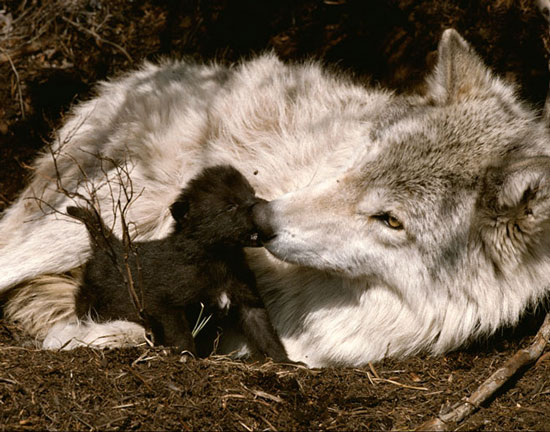
★ Newborns ★
Wolves give birth to 4-6 pups on average, with 2-3 pups also being common. Wolves are born blind, deaf, and unable to regulate their body temperature. Weighing less than 1ibs at birth, these newborns must rely on their mother for nourishment. The first 24 hours are essential, as this is where pups receive crucial antibodies from the mother's colostrum, protecting them from disease until their own immune systems develop. Newborns only drink milk. A mother will rarely leave the den. If she has to leave, such as to get food and water, then other wolves from the pack will watch over the pups until she returns.
They grow rather quickly. About 12 to 15 days after they are born, they open their eyes. By two weeks of age, the pups can walk, and about a week after that, they may come out of the den for the first time.
Did you know?
Most wolf pups are born with blue eyes, which gradually change to a yellow-gold color (or any color, for our wolves) as they mature!
Mothers must stimulate their pups to defecate/urinate by licking their genital areas. Mothers will also eat the excretions of her pups. Please don't feel the need to write this out in detail. Please.
Newborns must nurse every 4 to 6 hours.
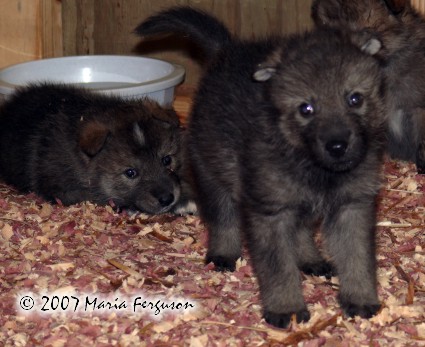
★ 3 Weeks ★
At this age the pups can walk, see, and hear. Pups will begin to explore the den, and may accidentally-- or purposely, find their way outside. Parents should keep a close eye on their curious little wolves and keep them tucked inside.
This is also the time where milk teeth come in, which will enable the young pups to eat regurgitated meat from their mother. Wolves weigh around 7 pounds at this age.
Did you know?
Pup mortality ranges from 30% to 60%. Pups die from disease, malnutrition, and starvation.
Predators such as eagles, coyotes, and bears all prey upon wolf pups. A pup wandering outside this age with no adult would make an easy meal.
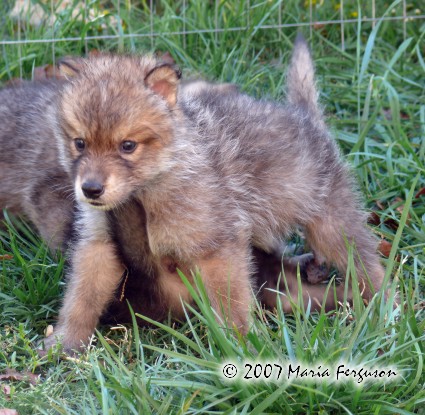
★ 4-6 weeks ★
Pups are now allowed to take shot trips outside the den. At this time, all members of the pack will watch and guard the pups. They will keep constant look out for any predators. The mother may now leave to go hunting for a few hours. Pups may also go up to other wolves and lick at their muzzle. This will cause the older wolf to throw up meat for the younger wolf to eat (yum).
Play-fighting begins at this age, and will determine the dominance and submission of each sibling later in life. This play also develops hunting and fighting skills.
At five to six weeks pups will begin the gradual process of weaning. They may also move up to a mile away from the den accompanied by an adult.

★ 8-10 Weeks ★
This is when pups are officially weaned, and will begin eating the food provided for them by adults. They will also be allowed to travel to the rendezvous site, which is a place where wolves gather to sleep, play, or just hang out (the center of the camp in our case)! An adult wolf will usually stay behind to watch the pups while the rest of the pack goes out hunting.
Adult hair will also begin to appear on the pup's body, and their eyes start to change from blue to gold.
Did you Know?
Occasionally, an adult wolf can be found with blue eyes.

★ 12 Weeks (Juvenile Period) ★
Pups will begin to follow adult wolves on hunting trips for a short while. They will not yet hunt at this age, but will instead go to observe and learn. They may return to the rendezvous site on their own.
The juveniles will now weigh around 22 to 30 pounds.
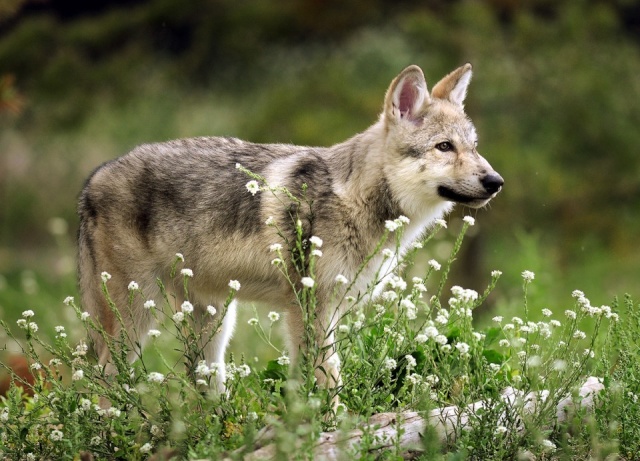
★ 3.5 Months (14-27 weeks)★
Also known as the period of rapid growth. Wolves gain 1.3 pounds per week for the next three months!
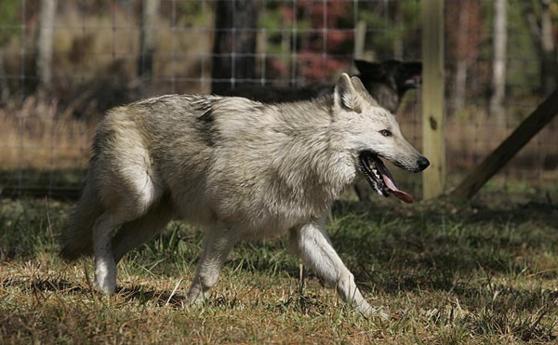
★ 4-6 Months ★
Pups are now almost indistinguishable from adults. Their milk teeth are replaced and winter fur becomes apparent.
They will now accompany adults on hunting trips.
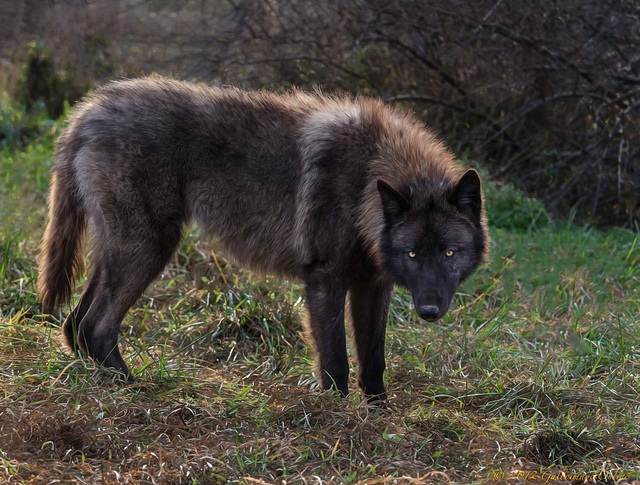
★ 7-8 Months ★
Begin to actively hunt within pack. This is also known as the period of slow growth, as the young wolves will only gain .5 pounds a week.
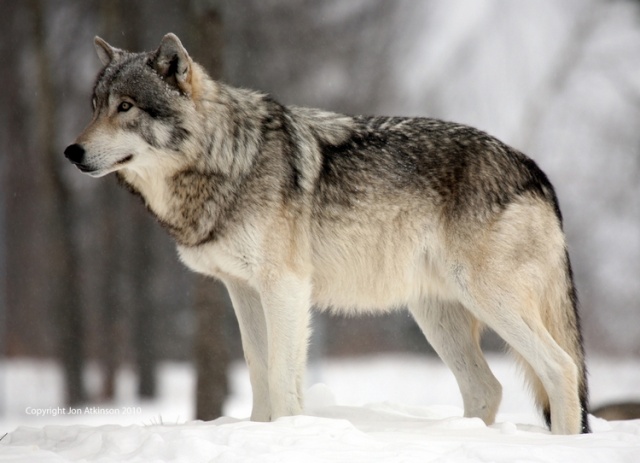
★ 1 Year ★
Now weighing 60-100 pounds, this marks the end of a wolf's growth period. The epiphyseal cartilage closes off, signaling the end of skeletal growth.
The pups status in the pack will start to show with the younger pups in the pack, displaying either a more dominant or submissive behavior.
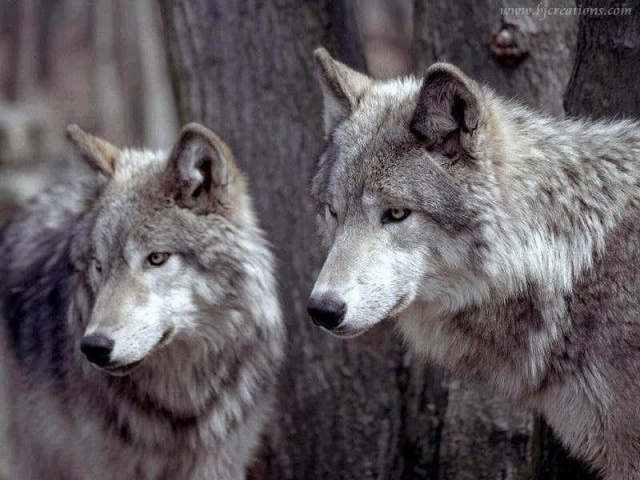
★ 1-3 Years ★
The wolf now reaches sexual maturity signaled by hormonal changes. They may chose to disperse from the pack to find a mate and start a new pack at this time. Wolves will weigh 60-100+ pounds.

★ Newborns ★
Wolves give birth to 4-6 pups on average, with 2-3 pups also being common. Wolves are born blind, deaf, and unable to regulate their body temperature. Weighing less than 1ibs at birth, these newborns must rely on their mother for nourishment. The first 24 hours are essential, as this is where pups receive crucial antibodies from the mother's colostrum, protecting them from disease until their own immune systems develop. Newborns only drink milk. A mother will rarely leave the den. If she has to leave, such as to get food and water, then other wolves from the pack will watch over the pups until she returns.
They grow rather quickly. About 12 to 15 days after they are born, they open their eyes. By two weeks of age, the pups can walk, and about a week after that, they may come out of the den for the first time.
Did you know?
Most wolf pups are born with blue eyes, which gradually change to a yellow-gold color (or any color, for our wolves) as they mature!
Mothers must stimulate their pups to defecate/urinate by licking their genital areas. Mothers will also eat the excretions of her pups. Please don't feel the need to write this out in detail. Please.
Newborns must nurse every 4 to 6 hours.

★ 3 Weeks ★
At this age the pups can walk, see, and hear. Pups will begin to explore the den, and may accidentally-- or purposely, find their way outside. Parents should keep a close eye on their curious little wolves and keep them tucked inside.
This is also the time where milk teeth come in, which will enable the young pups to eat regurgitated meat from their mother. Wolves weigh around 7 pounds at this age.
Did you know?
Pup mortality ranges from 30% to 60%. Pups die from disease, malnutrition, and starvation.
Predators such as eagles, coyotes, and bears all prey upon wolf pups. A pup wandering outside this age with no adult would make an easy meal.

★ 4-6 weeks ★
Pups are now allowed to take shot trips outside the den. At this time, all members of the pack will watch and guard the pups. They will keep constant look out for any predators. The mother may now leave to go hunting for a few hours. Pups may also go up to other wolves and lick at their muzzle. This will cause the older wolf to throw up meat for the younger wolf to eat (yum).
Play-fighting begins at this age, and will determine the dominance and submission of each sibling later in life. This play also develops hunting and fighting skills.
At five to six weeks pups will begin the gradual process of weaning. They may also move up to a mile away from the den accompanied by an adult.

★ 8-10 Weeks ★
This is when pups are officially weaned, and will begin eating the food provided for them by adults. They will also be allowed to travel to the rendezvous site, which is a place where wolves gather to sleep, play, or just hang out (the center of the camp in our case)! An adult wolf will usually stay behind to watch the pups while the rest of the pack goes out hunting.
Adult hair will also begin to appear on the pup's body, and their eyes start to change from blue to gold.
Did you Know?
Occasionally, an adult wolf can be found with blue eyes.

★ 12 Weeks (Juvenile Period) ★
Pups will begin to follow adult wolves on hunting trips for a short while. They will not yet hunt at this age, but will instead go to observe and learn. They may return to the rendezvous site on their own.
The juveniles will now weigh around 22 to 30 pounds.

★ 3.5 Months (14-27 weeks)★
Also known as the period of rapid growth. Wolves gain 1.3 pounds per week for the next three months!

★ 4-6 Months ★
Pups are now almost indistinguishable from adults. Their milk teeth are replaced and winter fur becomes apparent.
They will now accompany adults on hunting trips.

★ 7-8 Months ★
Begin to actively hunt within pack. This is also known as the period of slow growth, as the young wolves will only gain .5 pounds a week.

★ 1 Year ★
Now weighing 60-100 pounds, this marks the end of a wolf's growth period. The epiphyseal cartilage closes off, signaling the end of skeletal growth.
The pups status in the pack will start to show with the younger pups in the pack, displaying either a more dominant or submissive behavior.

★ 1-3 Years ★
The wolf now reaches sexual maturity signaled by hormonal changes. They may chose to disperse from the pack to find a mate and start a new pack at this time. Wolves will weigh 60-100+ pounds.

Robin- Lightning
- Posts : 352
Character(s)
Wolf: Jay's Wing; Jayfeather
Page 1 of 1
Permissions in this forum:
You cannot reply to topics in this forum





» The Random Game
» 'Sup fellas!
» Site and RP Update - Getting There!
» Things to ________ Over
» Embarrassing Moments and Failures in Life
» Biography Template
» Count to ___ Before the Alpha Posts
» Who Would It Be?